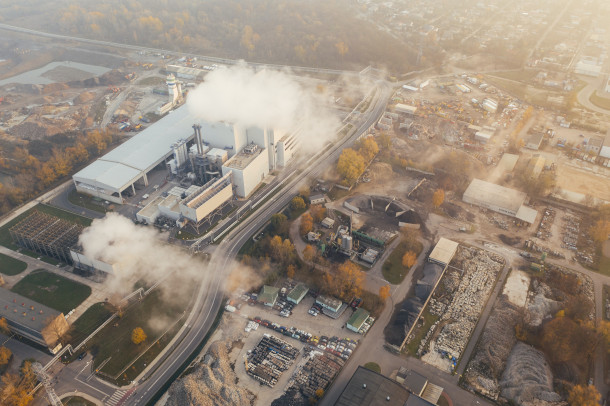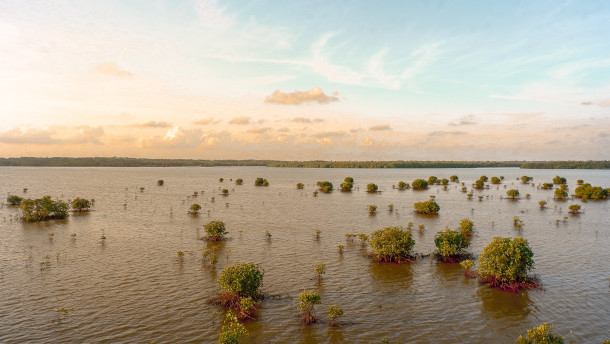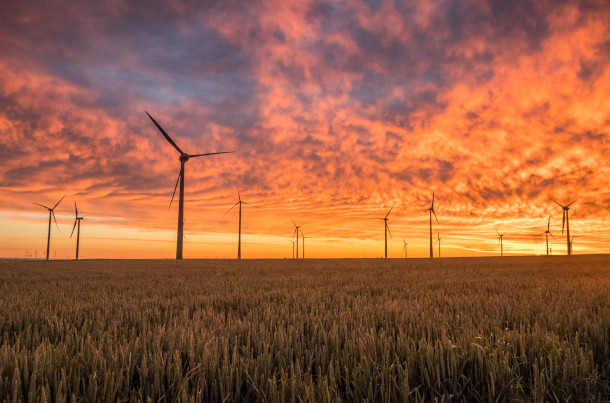Dire Climate Warning From IPCC
Air Date: Week of March 31, 2023

The latest Intergovernmental Panel on Climate Change (IPCC) Synthesis Report delivered a final warning on the climate crisis, as rising greenhouse gas emissions are now pushing the world closer to warming levels that would collapse civilization. (Photo: Chris LeBoutillier, Unsplash)
The world has no more than a year or two to start bending the curve of carbon emissions downward to avoid more drastic impacts of climate change, according to the latest scientific consensus the Intergovernmental Panel on Climate Change. UPenn climate scientist Michael Mann joins Host Steve Curwood to discuss what’s at stake for the planet and what’s necessary to keep warming below 1.5 degrees Celsius.
Transcript
BASCOMB: From PRX and the Jennifer and Ted Stanley studios at the University of Massachusetts Boston this is Living on Earth. I’m Bobby Bascomb.
CURWOOD: And I’m Steve Curwood.
Usually conservative, scientists are now sounding the alarm about climate change. They warn that if the world fails to stop cutting carbon emissions in the next year or so we will burn through the Paris agreement limit of 1.5 degrees Centigrade of average warming, with dire consequences. Since its establishment 35 years ago the collective scientists of the Intergovernmental Panel on Climate Change have been careful to avoid alarmist predictions and have made cautious projections about the advance of global warming. No more. The sixth and latest IPCC synthesis report of its three working groups cautions that the rising incidence of devastating storms, floods, fires, and heat waves show trouble from climate disruption is already baked in, even though we have yet to pass 1.5 degrees centigrade of warming. Getting hotter than that won’t suddenly push us over a cliff but they say unless we immediately start reducing emissions and cut them by 60 percent by 2035, more and more of us will get pulled into a cauldron that will eventually boil away our civilization. Michael Mann was a lead author of the IPCC’s third assessment report and directs the Center for Science, Sustainability & the Media at the University of Pennsylvania. Michael, welcome back to Living on Earth!
MANN: Thanks, Steve, it's great to be with you.
CURWOOD: What are your key takeaways from this latest IPCC report? I think it was 2015 when we last saw a full report, why does this report matter so much?
MANN: This report really is fundamentally different in tone, the IPCC has basically come out and said, Look, we really have a crisis on our hands. Now, we haven't made the progress in lowering carbon emissions that we had hoped to make over the past few years. And so it will take a far more Herculean effort now to keep warming below a catastrophic three degrees Fahrenheit, or one and a half degrees Celsius. This is about as close as you will ever come to hearing the scientific community scream at the top of their lungs from the highest buildings from the tallest buildings. That's basically what we're seeing.
CURWOOD: I think one of the startling lines in the report is that we have to stop increasing carbon emissions right away.

The IPCC report said carbon removals from the atmosphere are key to achieving the Paris Agreement target of limiting the global average temperature rise to below 1.5 Celsius. (Photo: Marcin Jozwiak, Unsplash)
MANN: Yeah, so carbon emissions have sort of flattened, okay, that's the good news here. They're not rising anymore. But the bad news is, it isn't enough to keep them flat, we've got to reduce carbon emissions by 60%. Now, by 2035, if we are to keep warming below three degrees Fahrenheit, where we really will start to see far worse consequences. We're already seeing devastating consequences. But there'll be that much worse if we exceed that level of warming. And to avoid doing that, there can be, for example, no new fossil fuel infrastructure.
CURWOOD: But the world is looking to add more fossil fuel infrastructure. I'm thinking of plans to drill in the Democratic Republic of the Congo, in the peatlands there, the approval of the willow project in Alaska for huge amounts of oil there. To what extent is this report say, no, we have to stop. Right now. We can't do any more infrastructure, we can't increase carbon emissions at all, if we are to have a chance.
MANN: So you're absolutely right, we can't continue these new coal fired power plant projects, new oil and gas pipelines to build new fossil fuel infrastructure. That's a decision to basically lock in place infrastructure that will deliver fossil fuels to the market for decades. That's what we have to stop doing. But ultimately, what will probably be the deciding factor is the demand. And so, if we can put in place the right incentives to shift demand away from fossil fuels, towards renewable energy, then even though that fossil fuel infrastructure is there, it will be less of a return on investment, it will be less profitable.
CURWOOD: So we're in it already exceeding that one and a half degrees Celsius target or three degrees Fahrenheit, roughly speaking, will put us in deeper trouble much deeper trouble. How can we reach this goal now?
MANN: If you look at the provisions of the inflation Reduction Act, independent experts have said that if they are basically implemented on time, that should be enough to keep warming below two degrees Celsius. So that's major progress from where we were headed, say back before the Paris Agreement, where we were headed towards something closer to four degrees Celsius, seven degrees Fahrenheit. Now, if we implement the existing commitments, we're looking at two degrees Celsius less than four degrees Fahrenheit. That's real progress. But it's not enough progress.

The report said increasing temperatures will result in substantially more poverty, extreme heat, sea level rise, habitat and coral reef loss, and drought, and if left unchecked would upend human civilization. (Photo: Rachman Reilli on Unsplash)
CURWOOD: Michael, you said that all things considered, we're probably looking at two and a half degrees centigrade rise closer to four degrees Fahrenheit rise. But there was recently an analysis by the World Resources Institute that says, if we do that, we're going to see fires of the increase in burnt areas across the Mediterranean Europe, for example 60 to 87%, greater than now. These things sound really disastrous. The heat, the extreme heat and fires and kind of the related drought sounds apocalyptic.
MANN: Yeah. And it's sort of interesting. You're absolutely right. And you know, a three degrees Celsius five degree Fahrenheit, warmer world is a world, it's hard to imagine. Because look at the devastating consequences we're seeing now. Just imagine doubling those impacts, making those storms, twice as intense. If we're already struggling to deal with the consequences of climate change fueled extreme weather events. Now, just imagine how much worse it'll be. This is why there's so much emphasis still on trying to limit the warming below one and a half C below three degrees Fahrenheit, because that's a level of warming that we feel we have the adaptive capacity to confront to deal with.
CURWOOD: And by the way, right now we're at 1.1 degrees centigrade warmer 1.2 degrees.
MANN: Yeah, it depends precisely on how you measure it, but we're close. We're at 1.2, I would say C, and we're talking about not going above 1.5. C, that isn't a lot of wiggle room, that's a few tenths of a degree see. And what that tells you is that our budget, our carbon budget, the amount of carbon that we can still burn and keep warming below one and a half Celsius, that is shrinking with each additional year where carbon emissions don't come down sufficiently. And that was one of the key take home messages of this latest IPCC synthesis report.
CURWOOD: Now there is some good news in a way in the IPCC report, because it says that sufficient support could be available for adaptation solutions, build some resilience to these climate risks. I mean, what are some of the most realistic solutions to our dilemma?
MANN: Well, I mean, they're coastal defenses that we can build to, you know, try to insulate ourselves from modest levels of sea level rise, once sea levels get too high, then ultimately, you have to start retreating away from the encroaching seas, and that's very expensive, requires a massive redistribution of infrastructure. So you know, there are things we can do there. When it comes to agriculture, there are ways to use different cultivars to grow different crops to try different strategies of crop rotation. So there are experts in each of these areas that have looked at the possible adaptations that we could take to try to insulate ourselves from sea level rise to try to insulate ourselves from the devastating possible impacts on agriculture, et cetera.
CURWOOD: So to what extent is the bad news already baked in? And what aspects Do we have a better chance to avoid? Do you think?
MANN: Yeah, so you know, the extreme weather events, the heat waves, the wildfires, the floods, the superstorms. To a large extent, those are really related to the warming of Earth's surface, the warming of the ocean surface, the warming of the planet surface. And we know the science tells us that once we bring carbon emissions to zero, the planet's surface stops warming up. So that's really important. So we're sort of stuck with the worsening of those impacts that we've already seen. In the best-case scenario, we've got to live with that. But we can prevent them from getting worse. Now, where things are a little more concerning, is with say, the behavior of the ice sheets, and sea level rise, those sort of components of the system are sort of more cumulative in nature, they are a consequence of sort of the inertia of the climate system and the oceans, you know, will continue to warm up for decades, the surface might start warming up, but the sub surface of the oceans will continue to warm as that heat from the surface sort of diffuses down and penetrates into the deep ocean, and sea level will expand as the ocean continues to heat up. And those ice sheets are very sluggish in their response. So once you start to see the disintegration of those ice shelves, and then parts of the ice sheet, it's very difficult to stop that. And so some of those impacts could continue to get worse. Even if we stop our carbon emissions. Even if we stop the surface of the planet from warming up.
CURWOOD: For the years that you've been working on this. There's been pretty robust discussion about this problem. But at the end of the day, we still aren't headed in the right direction, we may be slowing down, there may be some more awareness. But still, if we continue with the present rate, this report says we're really in for it. We are in the process of destroying our civilization. But what's the bright side here? What's the opportunity here? What's thing that we're missing?

The IPCC predicts the world could warm 2.4 degrees Celsius by mid-century—surpassing critical tolerance thresholds for agriculture and health. (Photo: Karsten Wuerth, Unsplash)
MANN: The reason for cautious optimism here is that we're not heading headlong into the climate crisis in the way that we were, say 10 or 20 years ago with our carbon emissions, they've stopped going up carbon emissions were rising, and that was deeply problematic. Now, they've sort of hit a plateau where they're no longer rising globally. And we know that that is due in substantial part to the decarbonization of the global economy. We are seeing movement away from fossil fuel energy to renewable energy. The obstacles at this point, aren't climate physics, and they're not technology. The obstacles right now are entirely political, and political obstacles can be overcome with enough sort of popular support with an uprising with a global movement like we're seeing now with climate, the Youth Climate movement has really sort of recenter the conversation where it always needed to be on our ethical obligation to act before it's too late. And I do think that we're seeing a tipping point of the good kind, it gives me hope that it's not too late for us to do this.
CURWOOD: Michael Mann is the director of the Center for Science, sustainability, and the Media at the University of Pennsylvania, and author of the forthcoming book, Our Fragile Moment. Professor thanks so much for taking the time with us today.
MANN: Thank you Steve, always a pleasure.
Links
The Guardian | “Scientists Deliver ‘Final Warning’ On Climate Crisis: Act Now or It’s Too Late”
The Nature Conservatory | “The Latest IPCC Report: What Is It and Why Does It Matter?
Living on Earth wants to hear from you!
Living on Earth
62 Calef Highway, Suite 212
Lee, NH 03861
Telephone: 617-287-4121
E-mail: comments@loe.org
Newsletter [Click here]
Donate to Living on Earth!
Living on Earth is an independent media program and relies entirely on contributions from listeners and institutions supporting public service. Please donate now to preserve an independent environmental voice.
NewsletterLiving on Earth offers a weekly delivery of the show's rundown to your mailbox. Sign up for our newsletter today!
 Sailors For The Sea: Be the change you want to sea.
Sailors For The Sea: Be the change you want to sea.
 The Grantham Foundation for the Protection of the Environment: Committed to protecting and improving the health of the global environment.
The Grantham Foundation for the Protection of the Environment: Committed to protecting and improving the health of the global environment.
 Contribute to Living on Earth and receive, as our gift to you, an archival print of one of Mark Seth Lender's extraordinary wildlife photographs. Follow the link to see Mark's current collection of photographs.
Contribute to Living on Earth and receive, as our gift to you, an archival print of one of Mark Seth Lender's extraordinary wildlife photographs. Follow the link to see Mark's current collection of photographs.
 Buy a signed copy of Mark Seth Lender's book Smeagull the Seagull & support Living on Earth
Buy a signed copy of Mark Seth Lender's book Smeagull the Seagull & support Living on Earth

